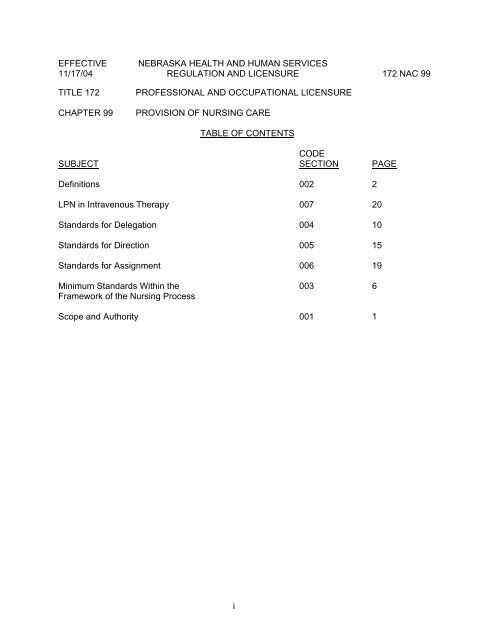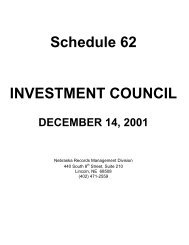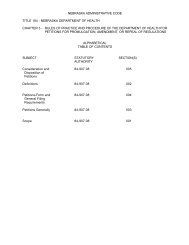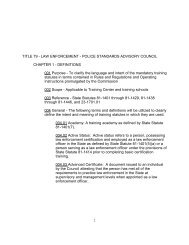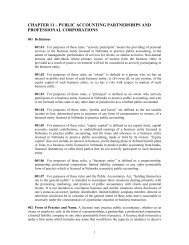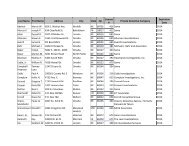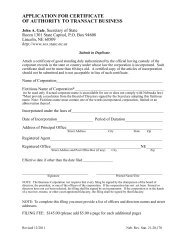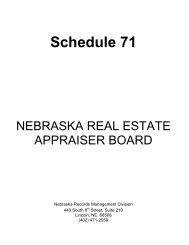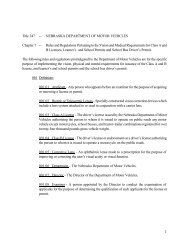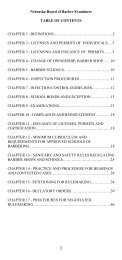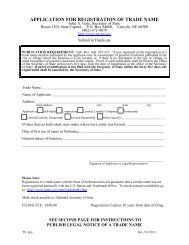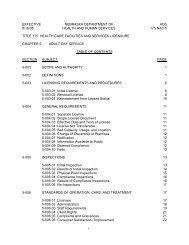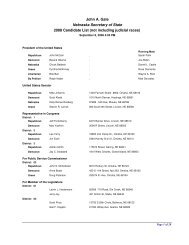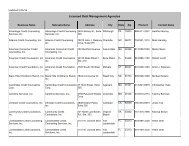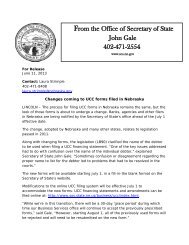Title 172 Chapter 99 - Nebraska Secretary of State
Title 172 Chapter 99 - Nebraska Secretary of State
Title 172 Chapter 99 - Nebraska Secretary of State
Create successful ePaper yourself
Turn your PDF publications into a flip-book with our unique Google optimized e-Paper software.
EFFECTIVE NEBRASKA HEALTH AND HUMAN SERVICES<br />
11/17/04 REGULATION AND LICENSURE <strong>172</strong> NAC <strong>99</strong><br />
TITLE <strong>172</strong><br />
CHAPTER <strong>99</strong><br />
PROFESSIONAL AND OCCUPATIONAL LICENSURE<br />
PROVISION OF NURSING CARE<br />
TABLE OF CONTENTS<br />
SUBJECT<br />
CODE<br />
SECTION<br />
PAGE<br />
Definitions 002 2<br />
LPN in Intravenous Therapy 007 20<br />
Standards for Delegation 004 10<br />
Standards for Direction 005 15<br />
Standards for Assignment 006 19<br />
Minimum Standards Within the<br />
Framework <strong>of</strong> the Nursing Process<br />
003 6<br />
Scope and Authority 001 1<br />
i
EFFECTIVE NEBRASKA HEALTH AND HUMAN SERVICES<br />
11/17/04 REGULATION AND LICENSURE <strong>172</strong> NAC <strong>99</strong><br />
TITLE <strong>172</strong><br />
CHAPTER <strong>99</strong><br />
PROFESSIONAL AND OCCUPATIONAL LICENSURE<br />
PROVISION OF NURSING CARE<br />
<strong>99</strong>-001 SCOPE AND AUTHORITY: These regulations govern the provision, administration, and<br />
management <strong>of</strong> nursing care by licensed nurses and by unlicensed persons providing auxiliary<br />
services in support <strong>of</strong> nursing service. Licensed nurses provide nursing care through a variety <strong>of</strong><br />
roles including: a) the direct provision <strong>of</strong> care, b) the indirect provision <strong>of</strong> care through<br />
administering, managing, and supervising the practice <strong>of</strong> nursing, c) the teaching <strong>of</strong> health care<br />
practice to individuals, families, and groups, and d) collaboration and consultation with other health<br />
pr<strong>of</strong>essionals in the management <strong>of</strong> health care. Licensed nurses provide nursing care through<br />
acute practice, long-term care practice, and community based practice. Licensed nurses are directly<br />
accountable and responsible to clients/patients for the nature and quality <strong>of</strong> all nursing care<br />
rendered.<br />
Registered nurses (RNs) practice nursing independently and inter-dependently through the<br />
application <strong>of</strong> the nursing process; registered nurses also practice nursing dependently through the<br />
execution <strong>of</strong> diagnostic or therapeutic regimens prescribed by licensed practitioners. The<br />
administration and management <strong>of</strong> nursing by RNs is an independent and interdependent practice<br />
and includes delegating, directing, and assigning nursing interventions that may be performed by<br />
others.<br />
Licensed practical nurses (LPNs) practice nursing dependently at the direction <strong>of</strong> registered nurses<br />
or licensed practitioners through the application <strong>of</strong> the nursing process and the execution <strong>of</strong><br />
diagnostic or therapeutic regimens prescribed by licensed practitioners. LPN practice includes the<br />
assumption <strong>of</strong> responsibilities and accountabilities for the performance <strong>of</strong> acts within their<br />
educational background and utilizing procedures leading to predictable outcomes. The<br />
administration and management <strong>of</strong> nursing by LPNs includes directing and assigning nursing<br />
interventions that may be performed by others.<br />
These regulations do not apply to a) persons who perform self-care; b) family, foster parents, or<br />
friends who provide home care; and c) persons performing health maintenance activities in<br />
accordance with Neb. Rev. Stat. § 71-1,132.30. These regulations also do not apply to the provision<br />
<strong>of</strong> activities <strong>of</strong> daily living and personal care by unlicensed persons when such cares do not rise to<br />
the level <strong>of</strong> requiring the application <strong>of</strong> nursing judgment or skill based upon a systematized body<br />
<strong>of</strong> nursing knowledge. These regulations do not alter the minimum requirements for nursing<br />
assistants as set forth in the <strong>Nebraska</strong> Nursing Home Act, for home health aides as set forth in<br />
Neb. Rev. Stat. §§ 71-6601 to 71-6615, and for medication aides as set forth in the Medication Aide<br />
Act, Neb. Rev. Stat. §§ 71-6718 to 71-6742.<br />
1
EFFECTIVE NEBRASKA HEALTH AND HUMAN SERVICES<br />
11/17/04 REGULATION AND LICENSURE <strong>172</strong> NAC <strong>99</strong><br />
<strong>99</strong>-002 DEFINITIONS: For the purposes <strong>of</strong> these regulations, the following definitions apply:<br />
Accountability means being responsible and answerable.<br />
1. Licensed nurse accountability means being responsible and answerable for decisions<br />
and for the action or inaction <strong>of</strong> self and/or others, and for the resultant client/patient<br />
outcomes related to decisions and action/inaction.<br />
2. Unlicensed person accountability means being responsible and answerable for the action<br />
or inaction <strong>of</strong> self.<br />
Act means Neb. Rev. Stat. §§ 71-1,132.04 to 71-1,143.53, known as the Nurse Practice Act.<br />
Activities <strong>of</strong> daily living (ADLs) means transfer/ambulation, exercising, toileting, feeding, and similar<br />
activities.<br />
Assessment means a systematic evaluation <strong>of</strong> the client/patient's condition and response to the<br />
therapy.<br />
Assignment means a licensed nurse appoints or designates another person the responsibility for<br />
performance <strong>of</strong> nursing interventions. Assignment IS NOT the transfer <strong>of</strong> authority; assignments<br />
are made to individuals who already have authority to provide nursing interventions either through<br />
licensors as a nurse or through delegation from the RN.<br />
Assist means to give aid and support in the performance <strong>of</strong> an activity.<br />
Authority means legal authority to provide nursing care granted through licensure as a registered<br />
nurse, licensure as a practical nurse, or through delegation from the RN.<br />
Auxiliary patient care services means care provided by persons authorized, assigned, or directed<br />
by licensed nurses or licensed practitioners in support <strong>of</strong> that pr<strong>of</strong>essional's practice.<br />
Competence means the state or quality <strong>of</strong> being capable as a result <strong>of</strong> having the required<br />
knowledge, skills, and ability.<br />
1. Licensed nurse competence means the ability <strong>of</strong> the nurse to apply interpersonal,<br />
technical and decision-making skills at the level <strong>of</strong> knowledge consistent with the<br />
prevailing standard for the nurse's current nursing practice role.<br />
2. Unlicensed person competence means the ability <strong>of</strong> the unlicensed person: 1) to utilize<br />
effective communication, 2) to collect basic objective and subjective data, 3) to perform<br />
selected non-complex nursing interventions safely, accurately, and according to standard<br />
procedures, and 4) to seek guidance and direction when appropriate.<br />
Counseling means the process <strong>of</strong> helping a client/patient to recognize and cope with stressful<br />
psychologic or social problems, to develop improved interpersonal relationships, and to promote<br />
personal growth. Counseling includes analysis <strong>of</strong> a situation, synthesis <strong>of</strong> information and<br />
experiences, and evaluation <strong>of</strong> the progress and productivity <strong>of</strong> client(s)/patient(s).<br />
2
EFFECTIVE NEBRASKA HEALTH AND HUMAN SERVICES<br />
11/17/04 REGULATION AND LICENSURE <strong>172</strong> NAC <strong>99</strong><br />
Delegation means the transference from one individual to another individual the authority,<br />
responsibility, and accountability to perform nursing interventions.<br />
1. Delegated by a Registered Nurse means the transference from an RN to an unlicensed<br />
person the authority, responsibility, and accountability to provide selected non-complex<br />
nursing interventions on behalf <strong>of</strong> the RN.<br />
2. Delegation decision includes determining which nursing intervention(s) may be delegated,<br />
selecting which unlicensed person(s) may provide the delegated interventions,<br />
determining the degree <strong>of</strong> detail and method to be used to communicate the delegation<br />
plan, and selecting a method <strong>of</strong> evaluation and supervision.<br />
Direction means the provision <strong>of</strong> guidance and supervision by a licensed nurse or licensed<br />
practitioner who is responsible to manage the provision <strong>of</strong> nursing interventions by another person.<br />
Employer guidelines include standards <strong>of</strong> care, job descriptions/role delineations and/or<br />
organizational policies and procedures.<br />
Licensed Nurse means a person licensed as a registered nurse or as a practical nurse under the<br />
provisions <strong>of</strong> the Act.<br />
Licensed Health Care Pr<strong>of</strong>essional means an individual who holds an active license to practice a<br />
defined scope <strong>of</strong> practice.<br />
Licensed Practitioner means a person lawfully authorized to prescribe medications or treatments.<br />
Monitor rate <strong>of</strong> flow means to verify and report the rate <strong>of</strong> flow <strong>of</strong> an intravenous fluid when the rate<br />
has been previously established.<br />
Nursing intervention means the initiation and completion <strong>of</strong> client/patient focused actions necessary<br />
to accomplish the goals defined in the plan <strong>of</strong> care. Examples include health maintenance<br />
activities, health promotion activities, client/patient teaching, counseling, referral, and<br />
implementation <strong>of</strong> diagnostic or therapeutic regimens <strong>of</strong> licensed practitioners.<br />
1. Complex interventions means those which require nursing judgment to safely alter<br />
standard procedures in accordance with the needs <strong>of</strong> the patient; or require nursing<br />
judgement to determine how to proceed from one step to the next; or require the multidimensional<br />
application <strong>of</strong> the nursing process.<br />
2. Non-complex interventions means those which can safely be performed according to<br />
exact directions, do not require alteration <strong>of</strong> the standard procedure, and for which the<br />
results and client/patient responses are predictable.<br />
Nursing Care means the application <strong>of</strong> the nursing process to individuals, families, and groups<br />
which results in the performance <strong>of</strong> any act expressing judgment or skill based upon principles <strong>of</strong><br />
the biological, physical, behavioral, and nursing sciences as defined through rules promulgated by<br />
the Board <strong>of</strong> Nursing in accordance with Neb. Rev. Stat. § 71-1,132.11.<br />
3
EFFECTIVE NEBRASKA HEALTH AND HUMAN SERVICES<br />
11/17/04 REGULATION AND LICENSURE <strong>172</strong> NAC <strong>99</strong><br />
Nursing Process means:<br />
1. assessing human responses to actual or potential health conditions;<br />
2. establishing nursing diagnoses;<br />
3. establishing a plan <strong>of</strong> care for the client/patient, including goals, outcomes, and<br />
prescriptions for nursing interventions;<br />
4. implementing the plan <strong>of</strong> care through the direct and indirect provision <strong>of</strong> nursing<br />
interventions; and<br />
5. evaluating client/patient responses to the plan <strong>of</strong> care and nursing interventions, and<br />
making adjustments to the plan <strong>of</strong> care based upon such evaluation.<br />
Nursing service delivery model means a framework selected by an organization which describes<br />
the method by which nursing services are provided and includes employer guidelines as defined<br />
in <strong>172</strong> NAC <strong>99</strong>-002.<br />
Pediatric Client means a client is both under the age <strong>of</strong> 18 and under the weight <strong>of</strong> 35 kilograms.<br />
Personal Care means bathing, hair care, nail care, shaving, dressing, oral care, and similar<br />
activities.<br />
Protocol means a written document that is created and/or approved by a RN or licensed practitioner<br />
which guides subjective and objective data collection, and defines interventions based upon the<br />
collected data.<br />
Regulate rate <strong>of</strong> flow means to set or alter the rate <strong>of</strong> flow <strong>of</strong> an intravenous fluid based upon the<br />
calculation <strong>of</strong> the rate by a registered nurse or licensed practitioner.<br />
Stable and/or Predictable means a situation where the client/patient's clinical and behavioral status<br />
and nursing care needs are determined by the RN and/or licensed practitioner to be non-fluctuating<br />
and consistent or where the fluctuations are expected and the interventions are planned, including<br />
those clients/patients whose deteriorating condition is expected.<br />
Supervision means the provision <strong>of</strong> oversight and includes maintaining accountability to determine<br />
whether or not nursing care is adequate and delivered appropriately. Supervision includes the<br />
assessment and evaluation <strong>of</strong> client/patient condition and responses to the nursing plan <strong>of</strong> care,<br />
and evaluation <strong>of</strong> the competence <strong>of</strong> persons providing nursing care.<br />
1. Conditions <strong>of</strong> supervision means the method <strong>of</strong> supervision (direct or indirect), the<br />
identification <strong>of</strong> the persons to be supervised as well as the nursing interventions being<br />
provided, and the stability and/or predictability <strong>of</strong> the client/patient(s)' condition.<br />
2. Direct supervision means that the responsible licensed nurse or licensed practitioner is<br />
physically present in the clinical area, and is available to assess, evaluate and respond<br />
immediately. Direct supervision DOES NOT mean that the responsible licensed nurse<br />
or licensed practitioner must be in the same room, or "looking-over-the-shoulder" <strong>of</strong> the<br />
persons providing nursing care.<br />
4
EFFECTIVE NEBRASKA HEALTH AND HUMAN SERVICES<br />
11/17/04 REGULATION AND LICENSURE <strong>172</strong> NAC <strong>99</strong><br />
3. Indirect supervision means that the responsible licensed nurse or licensed practitioner<br />
is available through periodic inspection and evaluation and/or tele-communication for<br />
direction, consultation and collaboration.<br />
Unlicensed person means a person who does not have a license to practice nursing and who<br />
functions in an assistant or subordinate role to the nurse. Unlicensed persons receive the authority<br />
to provide selected non-complex nursing interventions through delegation from the RN.<br />
5
EFFECTIVE NEBRASKA HEALTH AND HUMAN SERVICES<br />
11/17/04 REGULATION AND LICENSURE <strong>172</strong> NAC <strong>99</strong><br />
<strong>99</strong>-003 MINIMUM STANDARDS FOR NURSING CARE RESPONSIBILITIES OF LICENSED<br />
NURSES WITHIN THE FRAMEWORK OF THE NURSING PROCESS, INCLUDING<br />
PARAMETERS FOR DELEGATION AND ASSIGNMENT OF NURSING INTERVENTIONS,<br />
INCLUDE BUT ARE NOT LIMITED TO:<br />
Registered Nurse (RN)<br />
Based on independent,<br />
dependent,<br />
and<br />
interdependent functions:<br />
Licensed Practical Nurse<br />
(LPN)<br />
At the direction <strong>of</strong> RN or<br />
Licensed Practitioner:<br />
Unlicensed Person<br />
As assigned, delegated,<br />
and/or directed by the<br />
RN or as assigned and<br />
directed by the LPN<br />
<strong>99</strong>-<br />
003.01<br />
Assess<br />
-ing<br />
<strong>99</strong>-003.01A Conducts and<br />
documents nursing<br />
assessments <strong>of</strong> the health<br />
status <strong>of</strong> individuals,<br />
families, and groups by:<br />
1) Collecting objective and<br />
subjective data from<br />
observations, examinations,<br />
interviews, and written<br />
records. The data include<br />
but are not limited to:<br />
a) biophysical and<br />
emotional status<br />
including patterns <strong>of</strong><br />
coping and<br />
interacting;<br />
b) growth and<br />
development;<br />
c) cultural, spiritual, and<br />
socio-economic<br />
background;<br />
d) health history;<br />
e) information collected<br />
by other health team<br />
members;<br />
f) client/patient<br />
knowledge and<br />
perception about<br />
health status and<br />
potential, or<br />
maintaining health<br />
status;<br />
g) ability to perform<br />
activities <strong>of</strong> daily<br />
living and personal<br />
care;<br />
h) the client/patient's<br />
health goals;<br />
<strong>99</strong>-003.01B Contributes to<br />
the assessment <strong>of</strong> health<br />
status <strong>of</strong> individuals<br />
including interactions <strong>of</strong><br />
individuals with family<br />
members or group<br />
members, by:<br />
1) Collecting basic objective<br />
and subjective data from<br />
observations, examinations,<br />
interviews, and written<br />
records. The scope and<br />
depth <strong>of</strong> data collection is<br />
consistent with the<br />
educational preparation <strong>of</strong><br />
the LPN. Such data may<br />
include:<br />
a) physical and<br />
emotional status;<br />
b) growth and<br />
development;<br />
c) cultural, spiritual, and<br />
socio-economic<br />
background;<br />
d) health history,<br />
e) information collected<br />
by other health team<br />
members;<br />
f) client/patient<br />
understanding <strong>of</strong><br />
health status and<br />
self-care needs;<br />
g) ability to perform<br />
activities <strong>of</strong> daily<br />
living and personal<br />
care;<br />
h) environmental<br />
factors (e.g.,<br />
<strong>99</strong>-003.01C Contributes<br />
to the assessment <strong>of</strong> the<br />
health status <strong>of</strong><br />
individuals including<br />
interactions <strong>of</strong> individuals<br />
with family members or<br />
group members by:<br />
1) Collecting basic<br />
subjective and objective<br />
data from observations<br />
and interviews. The data<br />
to be collected is<br />
identified by the RN<br />
and/or LPN.<br />
2) Reporting and<br />
recording the collected<br />
data.<br />
6
EFFECTIVE NEBRASKA HEALTH AND HUMAN SERVICES<br />
11/17/04 REGULATION AND LICENSURE <strong>172</strong> NAC <strong>99</strong><br />
i) environmental<br />
factors (e.g.,<br />
physical, social,<br />
emotional and<br />
ecological); and<br />
j) available and<br />
accessible human<br />
and material<br />
resources.<br />
2) Sorting, selecting,<br />
reporting and<br />
recording the data.<br />
3) Validating, refining and<br />
modifying the data by<br />
utilizing available resources<br />
including interactions with<br />
the client/patient, family<br />
significant others, and<br />
health team members.<br />
physical, social,<br />
emotional and<br />
ecological); and<br />
i) available and<br />
accessible human<br />
and material<br />
resources;<br />
2) Recording and reporting<br />
the data.<br />
3) Assisting with validating,<br />
refining and modifying the<br />
data by utilizing available<br />
resources including<br />
interactions with the<br />
client/patient, family,<br />
significant others, and<br />
health team members.<br />
<strong>99</strong>-<br />
003.02<br />
Establi<br />
shing<br />
nursing<br />
diagno<br />
ses<br />
<strong>99</strong>-003.02A Utilizes all data<br />
to:<br />
1) Identify and document<br />
responses to actual or<br />
potential health conditions<br />
and derives nursing<br />
diagnosis(es):<br />
a) based upon<br />
synthesis <strong>of</strong> the<br />
collected data,<br />
b) which identify(ies)<br />
the needs and<br />
priorities <strong>of</strong> the<br />
client(s)/patient(s).<br />
2) Identify educational and<br />
counseling needs.<br />
<strong>99</strong>-003.02B Contributes to<br />
establishing nursing<br />
diagnoses which<br />
identify(ies) the needs <strong>of</strong><br />
the client/patient by:<br />
1) Identifying signs and<br />
symptoms <strong>of</strong> deviation from<br />
normal health status.<br />
2) Identifying overt learning<br />
needs.<br />
<strong>99</strong>-003.02C Identifies<br />
basic signs and<br />
symptoms <strong>of</strong> deviations<br />
from normal health<br />
status and provides<br />
basic information which<br />
licensed nurses use in<br />
identification <strong>of</strong> problems<br />
and needs.<br />
<strong>99</strong>-<br />
003.03<br />
Plannin<br />
g Care<br />
<strong>99</strong>-003.03A Develops a<br />
plan <strong>of</strong> care for individuals,<br />
families, and groups based<br />
on assessment and nursing<br />
diagnosis(es). This<br />
includes:<br />
1) Consideration <strong>of</strong> the<br />
cultural, ethnic, and spiritual<br />
needs <strong>of</strong> the client/patient;<br />
2) Consideration <strong>of</strong><br />
<strong>99</strong>-003.03B Participates in<br />
the development <strong>of</strong> the plan<br />
<strong>of</strong> care for individuals. This<br />
includes:<br />
1) Recognition <strong>of</strong> the<br />
client/patients cultural,<br />
ethnic, and spiritual needs;<br />
2) Recognition <strong>of</strong> the<br />
client/patient's beliefs and<br />
rights to choice;<br />
<strong>99</strong>-003.03C Contributes<br />
to the development <strong>of</strong><br />
the plan <strong>of</strong> care for<br />
individuals by reporting<br />
basic data.<br />
7
EFFECTIVE NEBRASKA HEALTH AND HUMAN SERVICES<br />
11/17/04 REGULATION AND LICENSURE <strong>172</strong> NAC <strong>99</strong><br />
client/patient decisions<br />
regarding treatment;<br />
3) Identification <strong>of</strong> priorities;<br />
4) Collaborating with<br />
client/patient to establish<br />
goals/outcomes;<br />
5) Prescribing nursing<br />
interventions;<br />
6) Identifying measures to:<br />
a) maintain comfort;<br />
b) support human<br />
functions and<br />
response; and<br />
7) Consideration <strong>of</strong><br />
educational and counseling<br />
measures to promote,<br />
maintain, and restore<br />
health; and<br />
8) Identifying community<br />
resources for continued<br />
care.<br />
3) Providing data;<br />
4)Contributing to the<br />
identification <strong>of</strong> priorities;<br />
5) Contributing to setting<br />
goals/outcomes; and<br />
6) Assisting in identification<br />
<strong>of</strong> measures to:<br />
a) maintain comfort;<br />
b) support human<br />
functions and<br />
response; and<br />
c) maintain an<br />
environment<br />
conducive to well<br />
being.<br />
7) Consideration <strong>of</strong> the<br />
overt learning needs <strong>of</strong> the<br />
client/patient.<br />
8) Contributing to<br />
identification <strong>of</strong> community<br />
resources for continued<br />
care.<br />
<strong>99</strong>-<br />
003.04<br />
Implem<br />
enting<br />
the<br />
plan <strong>of</strong><br />
care.<br />
<strong>99</strong>-003.04A Implements a<br />
plan <strong>of</strong> care including:<br />
1) Initiating nursing<br />
interventions through:<br />
a) writing nursing<br />
directives;<br />
b) giving direct care;<br />
c) assisting with care;<br />
d) providing education<br />
and counseling; and<br />
e) assigning, directing,<br />
and delegating.<br />
2) Implementing the<br />
diagnostic or therapeutic<br />
regimens <strong>of</strong> licensed<br />
practitioners.<br />
3) Providing an environment<br />
conducive to safety and<br />
health;<br />
3) Documenting nursing<br />
interventions and<br />
client/patient responses to<br />
care, and<br />
4) Communicating<br />
interventions and<br />
<strong>99</strong>-003.04B Participates in<br />
the assisting and giving <strong>of</strong><br />
care by:<br />
1) Providing care for<br />
client/patients whose<br />
conditions are stabilized<br />
and/or predictable;<br />
2) Under direct supervision<br />
<strong>of</strong> the RN, assisting with the<br />
provision <strong>of</strong> care for<br />
client/patients whose<br />
conditions are not stable<br />
and/or predictable and who<br />
are not competent to make<br />
informed decisions and<br />
provide necessary<br />
information;<br />
3) Implementing nursing<br />
care according to the<br />
priority <strong>of</strong> needs and<br />
established plan <strong>of</strong> care;<br />
4) Implementing diagnostic<br />
or therapeutic regimens <strong>of</strong><br />
licensed practitioners.<br />
5) Directing and assigning<br />
<strong>99</strong>-003.04C Participates<br />
in the giving <strong>of</strong> direct<br />
care by:<br />
1) Assisting with ADLs,<br />
personal cares, and<br />
encouraging self care;<br />
2) Providing comfort<br />
measures and emotional<br />
support to client/patients<br />
whose condition is stable<br />
and/or predictable;<br />
3) Assisting with basic<br />
maintenance and<br />
restorative nursing;<br />
4) Providing a safe and<br />
healthy environment;<br />
5) Documenting and<br />
communicating<br />
completion<br />
<strong>of</strong><br />
assigned/delegated<br />
activities<br />
and<br />
client/patient responses;<br />
and<br />
6) Seeking guidance and<br />
direction when<br />
8
EFFECTIVE NEBRASKA HEALTH AND HUMAN SERVICES<br />
11/17/04 REGULATION AND LICENSURE <strong>172</strong> NAC <strong>99</strong><br />
responses to other<br />
members <strong>of</strong> the health<br />
team.<br />
nursing interventions.<br />
6) Providing an environment<br />
conducive to safety and<br />
health;<br />
7) Documenting nursing<br />
interventions and<br />
client/patient responses to<br />
care; and<br />
8) Communicating<br />
interventions and<br />
responses to care to<br />
appropriate members <strong>of</strong> the<br />
health team.<br />
appropriate<br />
<strong>99</strong>-<br />
003.05<br />
Evaluat<br />
-ing<br />
respon<br />
se to<br />
interve<br />
ntions<br />
<strong>99</strong>-003.05A Evaluates the<br />
responses <strong>of</strong> individuals,<br />
families and groups to<br />
nursing interventions.<br />
1) Evaluation data must be<br />
documented and<br />
communicated to<br />
appropriate members <strong>of</strong> the<br />
health care team; and 2)<br />
Evaluation data must be<br />
used as a basis for:<br />
a) Reassessing<br />
client/patient health<br />
status;<br />
b) measuring<br />
outcomes and goal<br />
attainment;<br />
c) modifying nursing<br />
diagnosis(es);<br />
d) revising strategies<br />
<strong>of</strong> care; and<br />
e) prescribing<br />
changes in<br />
nursing<br />
interventions.<br />
<strong>99</strong>-003.05B Contributes to<br />
the evaluation <strong>of</strong> the<br />
responses <strong>of</strong> individuals to<br />
nursing interventions.<br />
1) Evaluation data must be<br />
documented and<br />
communicated to<br />
appropriate members <strong>of</strong> the<br />
health care team.<br />
2) Contribute to the<br />
modification <strong>of</strong> the plan <strong>of</strong><br />
care based upon the<br />
evaluation.<br />
<strong>99</strong>-003.05C Contributes<br />
to the evaluation.<br />
1) Document and<br />
communicate<br />
client/patient responses.<br />
2) Assist with collection<br />
<strong>of</strong> data.<br />
9
EFFECTIVE NEBRASKA HEALTH AND HUMAN SERVICES<br />
11/17/04 REGULATION AND LICENSURE <strong>172</strong> NAC <strong>99</strong><br />
<strong>99</strong>-004 STANDARDS FOR DELEGATION<br />
<strong>99</strong>-004.01 Delegation <strong>of</strong> Nursing Interventions. Full utilization <strong>of</strong> licensed nurses may require<br />
auxiliary patient care services provided by persons carrying out interventions for the support<br />
<strong>of</strong> nursing services as delegated by RNs, The scope <strong>of</strong> delegation may vary depending on the<br />
level <strong>of</strong> nursing judgement required for the interventions, the knowledge and skills <strong>of</strong> the<br />
unlicensed person, the method and frequency <strong>of</strong> supervision, and the client/patient's condition,<br />
ability, and willingness to be involved in the management <strong>of</strong> his/her own care.<br />
<strong>99</strong>-004.01A Premises <strong>of</strong> delegation.<br />
<strong>99</strong>-004.01A1 Only licensed nurses are legally authorized to practice nursing as<br />
defined in the Act.<br />
<strong>99</strong>-004.01A2 Only RNs licensed in accordance with the Act may delegate nursing<br />
interventions to be performed by others on behalf <strong>of</strong> the nurse. Such delegation<br />
must be in a manner that does not conflict with the Act or these regulations.<br />
<strong>99</strong>-004.01A3 RNs retain accountability for the application <strong>of</strong> nursing process when<br />
making the decision to delegate nursing interventions, and for the adequacy <strong>of</strong><br />
client/patient care and outcomes related to the delegation decision.<br />
<strong>99</strong>-004.01A4 Nursing is a process discipline based upon a systematized body <strong>of</strong><br />
nursing knowledge and cannot be reduced to a list <strong>of</strong> tasks. Individual tasks or<br />
activities labeled as nursing provided in isolation by unlicensed persons functioning<br />
independently <strong>of</strong> the nurse is unlawful and constitutes the practice <strong>of</strong> nursing without<br />
a license.<br />
<strong>99</strong>-004.01A5 Many nurses are employees <strong>of</strong> organizations. Within organizational<br />
hierarchy, the transference <strong>of</strong> organizational responsibility and accountability occurs<br />
within the decision making framework defined by the institution. Such a framework<br />
is a managerial division <strong>of</strong> responsibilities, and may include a nursing service<br />
delivery model and employer guidelines. The standards applied at the organizational<br />
level must meet or exceed the standards for delegation as defined within these<br />
regulations.<br />
<strong>99</strong>-004.01A6 Although unlicensed persons may be used to complement licensed<br />
nurses in the provision <strong>of</strong> nursing care, such persons cannot be used as a substitute<br />
for the licensed nurse.<br />
<strong>99</strong>-004.01B Standards for Delegation.<br />
<strong>99</strong>-004.01B1 RNs must use a systematic delegation decision making process<br />
based upon nursing education, a body <strong>of</strong> nursing knowledge, and nursing<br />
judgement to delegate in a manner that allows for safe, accountable, and<br />
responsible provision <strong>of</strong> nursing care.<br />
10
EFFECTIVE NEBRASKA HEALTH AND HUMAN SERVICES<br />
11/17/04 REGULATION AND LICENSURE <strong>172</strong> NAC <strong>99</strong><br />
<strong>99</strong>-004.01B2 RNs must match the level <strong>of</strong> judgement required for the selected<br />
interventions with the experience and competency <strong>of</strong> the unlicensed person(s) and<br />
with the level <strong>of</strong> supervision available.<br />
<strong>99</strong>-004.01B3 The detail and method <strong>of</strong> communication must be congruent with the<br />
level <strong>of</strong> nursing judgement required for the delegated nursing intervention and the<br />
experience and competency <strong>of</strong> the unlicensed person and the frequency and<br />
method <strong>of</strong> supervision.<br />
<strong>99</strong>-004.01B4 Nursing service administrators may select nursing service delivery<br />
models and develop employer guidelines for the provision <strong>of</strong> nursing care that do<br />
not conflict with the Act or these regulations. Nursing service administrators are<br />
accountable to provide adequate resources to carry out the delegation plan.<br />
<strong>99</strong>-004.01B5 Staff RNs may utilize employer guidelines in the delegation decision<br />
making process but retain accountability for individual delegation decisions, the<br />
delegation plan, and evaluation <strong>of</strong> delegation outcomes.<br />
<strong>99</strong>-004.01C Delegation Process. RNs must utilize a decision making process to<br />
delegate in a manner that protects public health, welfare, and safety. Such a process<br />
must include:<br />
1. Assessing client/patient(s) and resources.<br />
a. Nursing service administrators must assess the health status <strong>of</strong> group(s)<br />
<strong>of</strong> client/patients, analyze the data and identify collective nursing care<br />
needs, priorities, and necessary resources.<br />
b. Staff RNs must assess client/patients individual health status, analyze the<br />
data, and identify the client/patient's specific goals, nursing care needs<br />
and necessary interventions.<br />
2. Developing a delegation plan. The delegation plan must include:<br />
a. Selecting and identifying nursing interventions which may be delegated.<br />
(1) Selected interventions must be those:<br />
(a) which frequently recurs in the daily care <strong>of</strong> a client/patient or<br />
group <strong>of</strong> clients/patients,<br />
(b) which do not require the unlicensed person to exercise<br />
independent nursing judgment,<br />
(c) which do not require complex and/or multi-dimensional<br />
application <strong>of</strong> the nursing process,<br />
11
EFFECTIVE NEBRASKA HEALTH AND HUMAN SERVICES<br />
11/17/04 REGULATION AND LICENSURE <strong>172</strong> NAC <strong>99</strong><br />
(d)<br />
(e)<br />
for which the results <strong>of</strong> the intervention are predictable and the<br />
potential risk is minimal, and<br />
which utilize a standard and unchanging procedure.<br />
(2) Interventions which must not be delegated include, but are not limited<br />
to:<br />
(a)<br />
(b)<br />
(c)<br />
(d)<br />
(e)<br />
activities including data collection, problem identification, and<br />
outcome evaluation which require independent nursing<br />
judgement;<br />
teaching except for that related to promoting independence in<br />
personal care and activities <strong>of</strong> daily living;<br />
counseling, except that unlicensed persons may be instructed<br />
to recognize and report basic deviations from healthy behavior<br />
and communication patterns, and may provide listening,<br />
empathy, and support.<br />
coordination and management <strong>of</strong> care including collaborating,<br />
consulting, and referring;<br />
triage and/or the giving <strong>of</strong> advice; and<br />
(f) treatments which are complex interventions as defined in <strong>172</strong><br />
NAC <strong>99</strong>-002.<br />
(3) RNs must identify the selected nursing interventions.<br />
a) Nursing service administrators must identify selected<br />
interventions through an organizational description <strong>of</strong> a nursing<br />
service delivery model and employer guidelines.<br />
(b)<br />
Staff RNs must identify selected interventions on an individual<br />
basis.<br />
(4) If an RN delegates medication provision, such delegation must be<br />
done in accordance with the Medication Aide Act, Neb. Rev. Stat. §§<br />
71-6718 to 71-6742.<br />
b. Selecting and identifying unlicensed persons providing auxiliary patient<br />
care services in support <strong>of</strong> nursing and to whom nursing interventions<br />
may be delegated.<br />
(1) RNs must assess and identify the unlicensed person(s)<br />
education/training, experience, and competency to provide selected<br />
nursing interventions .<br />
12
EFFECTIVE NEBRASKA HEALTH AND HUMAN SERVICES<br />
11/17/04 REGULATION AND LICENSURE <strong>172</strong> NAC <strong>99</strong><br />
(2) Nursing service administrators must establish organizational<br />
standards which identify educational and training requirements, and<br />
competency measurements <strong>of</strong> unlicensed persons. Nursing service<br />
administrators must identify unlicensed persons by a position title<br />
and role delineation/job description.<br />
(3) Staff RNs must instruct and/or assess, verify, and identify the<br />
unlicensed person's competency on an individual and client/patient<br />
specific basis.<br />
c. Selecting and identifying the methods <strong>of</strong> supervision and the licensed<br />
health care pr<strong>of</strong>essionals responsible to provide supervision.<br />
(1) The method <strong>of</strong> supervision and the frequency <strong>of</strong> assessment,<br />
inspection, and evaluation must be determined by RNs after an<br />
evaluation <strong>of</strong> the involved factors including, but not limited to the<br />
following:<br />
(a)<br />
(b)<br />
(c)<br />
(d)<br />
the willingness and ability <strong>of</strong> the client/patient to be involved in<br />
the management <strong>of</strong> his/her own care;<br />
the stability <strong>of</strong> the client/patients condition;<br />
the experience and competency <strong>of</strong> the unlicensed person(s)<br />
providing nursing interventions; and<br />
the level <strong>of</strong> nursing judgement required for the delegated nursing<br />
interventions.<br />
(2) Nursing service administrators must establish organizational<br />
standards and employer guidelines which provide for sufficient<br />
supervision to assure that the nursing care is adequate and meets<br />
the needs <strong>of</strong> the client/patients. Nursing service administrators must<br />
identify the licensed health care pr<strong>of</strong>essionals responsible to provide<br />
supervision by a position title and role delineation/job description.<br />
(3) Staff RNs must determine the method <strong>of</strong> supervision on an individual<br />
basis and identify any other licensed nurses who have been<br />
assigned the responsibility for supervision.<br />
d. Communicating the delegation plan.<br />
(1) Nursing service administrators must communicate the delegation plan<br />
to licensed nurses responsible to provide supervision and to<br />
unlicensed persons(s) responsible to provide nursing interventions<br />
through description <strong>of</strong> a nursing service delivery model and employer<br />
guidelines.<br />
13
EFFECTIVE NEBRASKA HEALTH AND HUMAN SERVICES<br />
11/17/04 REGULATION AND LICENSURE <strong>172</strong> NAC <strong>99</strong><br />
(2) Staff RNs must communicate decisions regarding selected<br />
interventions and the conditions <strong>of</strong> supervision to licensed nurses<br />
responsible to provide supervision and to unlicensed person(s)<br />
responsible to provide nursing interventions as appropriate and on<br />
an individual basis.<br />
(a)<br />
Communication <strong>of</strong> selected interventions to unlicensed persons<br />
must be in accordance with <strong>172</strong> NAC <strong>99</strong>-005.02 item 3.<br />
3. Implementing the delegation plan by providing direction and supervision.<br />
a. Direction must include:<br />
(1) initial instruction related to the delegated intervention(s);<br />
(2) monitoring to assure that the delegated nursing intervention(s) have<br />
been provided; and<br />
(3) evaluating client/patient responses and delegated nursing<br />
interventions.<br />
b. Supervision:<br />
(1) may be provided by the delegating RN, by other licensed health care<br />
pr<strong>of</strong>essionals identified in the delegation plan in accordance with <strong>172</strong><br />
NAC <strong>99</strong>-004.01C item 2.c., and/or by licensed nurses directing<br />
unlicensed persons in accordance with<strong>172</strong> NAC <strong>99</strong>-005.02.<br />
(2) must include direct supervision, indirect supervision, or a combination<br />
<strong>of</strong> both methods.<br />
(a)<br />
(b)<br />
RNs may utilize both direct and indirect methods <strong>of</strong> supervision.<br />
When indirect supervision methods are utilized, RNs must be<br />
available through telecommunication.<br />
LPNs may only utilize direct methods <strong>of</strong> supervision.<br />
4. Evaluating the delegation plan by:<br />
a. obtaining feedback from unlicensed persons;<br />
b. providing feedback to unlicensed persons;<br />
c. measuring client/patient response and goal attainment related to the<br />
delegated interventions; and<br />
d. altering the delegation plan as indicated by client/patient response.<br />
14
EFFECTIVE NEBRASKA HEALTH AND HUMAN SERVICES<br />
11/17/04 REGULATION AND LICENSURE <strong>172</strong> NAC <strong>99</strong><br />
<strong>99</strong>-005 STANDARDS FOR DIRECTION: In the administration and management <strong>of</strong> nursing care,<br />
RNs, LPNs, and licensed practitioners provide direction. RNs and licensed practitioners provide<br />
direction to LPNs; RNs and LPNs provide direction to unlicensed persons providing auxiliary patient<br />
care services. The method and degree <strong>of</strong> direction may vary based upon client/patient condition,<br />
the interventions to be applied, and the qualifications and competency <strong>of</strong> the person providing the<br />
interventions.<br />
<strong>99</strong>-005.01 Standards for LPNs to receive direction from RNs and licensed practitioners.<br />
<strong>99</strong>-005.01A<br />
For valid direction to occur:<br />
1. direction must be in a manner that sufficiently instructs and guides LPNs to<br />
assure that the nursing care provided is adequate to meet the client/patient<br />
needs;<br />
2. direction may include identification <strong>of</strong> any specific assessment data to be<br />
collected relative to client/patient condition, client/patient diagnosis, and/or<br />
presenting signs and symptoms <strong>of</strong> the client/patient;<br />
3. direction may include identification <strong>of</strong> the specific interventions to be applied<br />
based upon the collected assessment data and/or client/patient response to<br />
interventions; and<br />
4. direction must include the provision <strong>of</strong> supervision to LPNs. Supervision may<br />
include direct, indirect, or a combination <strong>of</strong> direct and indirect methods.<br />
<strong>99</strong>-005.01B<br />
LPNs must:<br />
1. practice nursing only under circumstances in which direction is provided by a<br />
RN or licensed practitioner;<br />
2. exercise competence in providing and directing nursing interventions;<br />
3. initiate consultation/collaboration according to observed signs and symptoms<br />
<strong>of</strong> deviations from normal health status, and/or according to the directions<br />
specified by the RN or licensed practitioner; and<br />
4. provide nursing interventions according to the direction and instructions<br />
identified by the RN or licensed practitioner.<br />
<strong>99</strong>-005.01C Methods and circumstances by which LPNs may receive direction from<br />
RNs and licensed practitioners must be similar to the following:<br />
1. Indirect supervision provided through protocols.<br />
a. Acceptable circumstances are when client/patient conditions are stable<br />
and/or predictable, or when the client/patient is competent to make<br />
15
EFFECTIVE NEBRASKA HEALTH AND HUMAN SERVICES<br />
11/17/04 REGULATION AND LICENSURE <strong>172</strong> NAC <strong>99</strong><br />
informed decisions and provide necessary information relative to the<br />
interventions.<br />
b. Standards for protocols must include the following. Protocols must:<br />
(1) be written;<br />
(2) identify any specific assessment data in accordance with <strong>172</strong> NAC<br />
<strong>99</strong>-005.01A items 1 and 2; and<br />
(3) identify interventions which maybe provided. Interventions may<br />
include (1) monitoring client/patient condition by the LPN, (2) the<br />
direct provision <strong>of</strong> nursing interventions by the LPN, (3) referral to<br />
another licensed health care provider for service, and/or (4)<br />
consultation with a RN or licensed practitioner for specific direction.<br />
c. When protocols are used, indirect supervision by the RN or licensed<br />
practitioner must include:<br />
(1) evaluation by the RN or licensed practitioner to determine the<br />
adequacy <strong>of</strong> the protocols to serve the intended purpose; and<br />
(2) availability <strong>of</strong> the RN or licensed practitioner, or an appropriate<br />
substitute, to the LPN by telecommunication for consultation and<br />
collaboration. By way <strong>of</strong> example, an appropriate substitute may be<br />
a licensed practitioner in an emergency room, the client/patient's<br />
primary health care provider, or another specifically designated RN.<br />
2. Indirect supervision provided through periodic inspection and evaluation in<br />
combination with nursing and medical plans <strong>of</strong> care and, when appropriate,<br />
employer guidelines.<br />
a. Acceptable circumstances are when client/patient condition is stable and/or<br />
predictable but the client/patient may or may not be competent to make<br />
an informed decision, and may or may not be capable <strong>of</strong> providing<br />
information relative to interventions.<br />
(1) An exception to the requirement for the client/patient condition to be<br />
stable and/or predictable may be when the client is competent to<br />
make informed decisions and provide necessary information relative<br />
to the interventions.<br />
b. Standards for nursing and medical plans <strong>of</strong> care and, when appropriate,<br />
employer guidelines must include the following. Plan(s) <strong>of</strong> care and/or<br />
employer guidelines must:<br />
(1) be written, and may be augmented by verbal direction and feedback<br />
from the RN or licensed practitioner,<br />
16
EFFECTIVE NEBRASKA HEALTH AND HUMAN SERVICES<br />
11/17/04 REGULATION AND LICENSURE <strong>172</strong> NAC <strong>99</strong><br />
(2) identify any specific assessment data in accordance with <strong>172</strong> NAC<br />
<strong>99</strong>-005.01A items 1 and 2.<br />
(3) identify appropriate interventions. Interventions may include (1) all<br />
<strong>of</strong> the interventions listed above in <strong>172</strong> NAC <strong>99</strong>-005.01C item 1.b.(3),<br />
and (2) the indirect provision <strong>of</strong> non-complex interventions through<br />
direction and assignment <strong>of</strong> auxiliary patient care services by the<br />
LPN to unlicensed persons in accordance with <strong>172</strong> NAC <strong>99</strong>-005.02<br />
and <strong>172</strong> NAC <strong>99</strong>-006.03.<br />
(c)<br />
When nursing and medical plans <strong>of</strong> care and, when appropriate, employer<br />
guidelines are used, indirect supervision by the RN or licensed practitioner<br />
must include:<br />
(1) periodic inspection and evaluation, the frequency <strong>of</strong> which must be<br />
determined by the RN or licensed practitioner. Factors to be<br />
considered include the competency <strong>of</strong> the LPN and the stability <strong>of</strong><br />
the client/patient condition(s); and<br />
(2) availability <strong>of</strong> the RN or licensed practitioner, or an appropriate<br />
substitute, to the LPN by telecommunication for consultation and<br />
collaboration.<br />
3. Direct supervision in combination with nursing and medical plans <strong>of</strong> care and,<br />
when appropriate, employer guidelines.<br />
a. Appropriate circumstances for direct supervision are when client/patient<br />
conditions and responses to interventions are not stable and/or<br />
predictable, and when client/patient(s) are not competent to make<br />
informed decisions or provide necessary information thereby requiring<br />
frequent assessment by the RN or licensed practitioner.<br />
b. Standards for plans <strong>of</strong> care and employer guidelines must include the<br />
following. Plans <strong>of</strong> care and employer guidelines must:<br />
(1) be written, and may be augmented by verbal direction and feedback<br />
from the RN or licensed practitioner,<br />
(2) identify specific assessment data to be collected for a specific<br />
client/patient, and<br />
(3) identify interventions which are to be directly provided by the LPN for<br />
a specific client/patient. Client/patient specific instruction must be<br />
included when appropriate.<br />
c. When warranted by the circumstances described <strong>172</strong> NAC <strong>99</strong>-005.01C<br />
items 3.a., direct supervision by the RN or licensed practitioner must<br />
17
EFFECTIVE NEBRASKA HEALTH AND HUMAN SERVICES<br />
11/17/04 REGULATION AND LICENSURE <strong>172</strong> NAC <strong>99</strong><br />
include frequent evaluation <strong>of</strong> client/patient condition and response to the<br />
nursing plan <strong>of</strong> care.<br />
<strong>99</strong>-005.02 Licensed nurses direct the provision <strong>of</strong> auxiliary patient care services provided<br />
by unlicensed persons in support <strong>of</strong> nursing services. The degree <strong>of</strong> direction is dependent<br />
upon the competency <strong>of</strong> the unlicensed provider, the nature <strong>of</strong> the nursing interventions, and<br />
the condition <strong>of</strong> the client/patient.<br />
<strong>99</strong>-005.02A<br />
Standards for licensed nurses to provide direction to unlicensed persons:<br />
1. Licensed nurses must direct unlicensed persons in the provision <strong>of</strong> nursing<br />
interventions only if such unlicensed persons have received authority to provide<br />
nursing interventions through delegation from an RN in accordance with the<br />
provisions <strong>of</strong> <strong>172</strong> NAC <strong>99</strong>-004.01.<br />
2. Licensed nurses must be knowledgeable <strong>of</strong> the delegation plan and the<br />
conditions <strong>of</strong> supervision. Licensed nurses must obtain knowledge <strong>of</strong> the<br />
delegation plan through the organizational nursing service delivery model and<br />
employer guidelines, and as may be augmented by the delegating RN.<br />
3. Licensed nurses must communicate to the unlicensed person the conditions<br />
<strong>of</strong> any assignment for which the licensed nurse is responsible to provide<br />
direction. Communication may be either written and/or oral and may include as<br />
appropriate:<br />
a. the specific observations to be monitored, and the expected method <strong>of</strong><br />
communication to report such observations;<br />
b. the specific interventions to be applied, and any client/patient specific<br />
instructions arid/or limitations;<br />
c. the expected results <strong>of</strong> nursing interventions; and<br />
d. the unexpected results or potential complications <strong>of</strong> nursing interventions,<br />
including the method and time lines for communicating such to the<br />
licensed nurse<br />
4. RNs may provide direction to unlicensed persons through both direct or indirect<br />
supervision.<br />
5. LPNs must provide direction to unlicensed persons only through direct<br />
supervision.<br />
6. Licensed nurses must monitor and evaluate the nursing care provided by<br />
unlicensed personnel to assure that care is adequate and meets the needs <strong>of</strong><br />
the client/patient, and<br />
18
EFFECTIVE NEBRASKA HEALTH AND HUMAN SERVICES<br />
11/17/04 REGULATION AND LICENSURE <strong>172</strong> NAC <strong>99</strong><br />
7. Licensed nurses must evaluate the competence <strong>of</strong> the unlicensed persons<br />
providing nursing interventions relative to specific assignments.<br />
19
EFFECTIVE NEBRASKA HEALTH AND HUMAN SERVICES<br />
11/17/04 REGULATION AND LICENSURE <strong>172</strong> NAC <strong>99</strong><br />
<strong>99</strong>-006 STANDARDS FOR ASSIGNMENT: In the administration and management <strong>of</strong> nursing<br />
care, licensed nurses may assign the responsibility for performance <strong>of</strong> nursing interventions to other<br />
persons. Assignments <strong>of</strong> nursing interventions are made by licensed nurses to others who are<br />
authorized to provide nursing care through licensure as a registered nurse, licensure as a practical<br />
nurse, or through delegation from a registered nurse to an unlicensed person.<br />
<strong>99</strong>-006.01 Standards for assignments by licensed nurse to other licensed nurses.<br />
<strong>99</strong>-006.01A<br />
RNs and LPNs must:<br />
1. assign only those nursing interventions authorized by the level <strong>of</strong> nursing<br />
for which the nurse receiving the assignment is licensed, and<br />
2. assign only those nursing interventions for which the nurse making the<br />
assignments has reason to believe the nurse receiving the assignment is<br />
competent to provide.<br />
a. The nursing service administrator is responsible to assess and evaluate<br />
to determine that licensed nurses have the required competencies<br />
expected for the nurse's nursing practice role.<br />
b. The nurse making assignments is responsible to assess the competence<br />
<strong>of</strong> the nurse accepting the assignment to fulfill the specific patient care<br />
assignment.<br />
<strong>99</strong>-006.01B RNs may assign the responsibility <strong>of</strong> supervision within the delegation plan<br />
to other licensed nurses only if the conditions <strong>of</strong> the supervision as defined in <strong>172</strong> NAC<br />
<strong>99</strong>-002 have been communicated.<br />
<strong>99</strong>-006.02 Standards for licensed nurses accepting assignments.<br />
<strong>99</strong>-006.02A<br />
RNs and LPNs must:<br />
1. accept only those assignments authorized by the level <strong>of</strong> nursing for which the<br />
nurse receiving the assignment is licensed,<br />
2. accept only those assignments for which he/she has the required knowledge,<br />
skills, and abilities,<br />
3. acknowledge personal limitations in knowledge and skills, and communicate<br />
the need for specialized instruction prior to accepting any assignments, and<br />
4. give sufficient notice <strong>of</strong> intent to refuse an assignment so as to allow the nurse<br />
making the assignment to make alternative arrangements for the assignment.<br />
<strong>99</strong>-006.02B LPNs may accept assignments only when direction by a licensed<br />
practitioner or RN is provided in accordance with <strong>172</strong> NAC <strong>99</strong>-005.<br />
20
EFFECTIVE NEBRASKA HEALTH AND HUMAN SERVICES<br />
11/17/04 REGULATION AND LICENSURE <strong>172</strong> NAC <strong>99</strong><br />
<strong>99</strong>-006.03 Standards for assignments by licensed nurses to unlicensed persons. RNs and<br />
LPNs must:<br />
1. make assignments only to those unlicensed persons authorized through delegation<br />
from the RN in accordance with <strong>172</strong> NAC <strong>99</strong>-004.01, and<br />
2. determine assignments within the framework <strong>of</strong> the delegation plan as described in<br />
<strong>172</strong> NAC <strong>99</strong>-004.01C item 2. RNs and LPNs may limit assignment(s) according to<br />
competency <strong>of</strong> the unlicensed person and the current nursing care needs <strong>of</strong> the<br />
client/patient condition.<br />
<strong>99</strong>-007 APPROPRIATE ROLE OF THE LPN IN INTRAVENOUS THERAPY: This section is<br />
intended to define appropriate nursing interventions, based on the LPN's knowledge and skills<br />
acquired in an approved practical nursing educational program, which the LPN may accept as a<br />
directed activity related to intravenous therapy. The interventions must be within the scope <strong>of</strong><br />
practice <strong>of</strong> the licensed practitioner or registered nurse directing the activity.<br />
<strong>99</strong>-007.01 Acceptance <strong>of</strong> directed activities related to intravenous therapy. A LPN may<br />
accept responsibility for provision <strong>of</strong> the following interventions:<br />
1. Assisting in initiating intravenous therapy;<br />
2. Monitoring the rate <strong>of</strong> flow;<br />
3. Temporarily slowing the rate <strong>of</strong> flow and reporting observations;<br />
4. Discontinuing peripheral intravenous catheters that are no more than three inches<br />
in length;<br />
5. Assisting in the administration <strong>of</strong> blood transfusions, hypodermoclysis, and<br />
hyperalimentation;<br />
6. Regulating the rate <strong>of</strong> flow including the use <strong>of</strong> regulatory equipment;<br />
7. Adding intravenous solutions to an established peripheral line, excluding those on<br />
pediatric clients. Solutions must be unmedicated, commercially prepared or<br />
prepared by a pharmacist or registered nurse, and may include vitamins and/or KCl.<br />
Acceptable intravenous solutions are limited to those fluids that are generally used<br />
as maintenance and isotonic in nature; and<br />
8. Changing <strong>of</strong> intravenous tubing for peripheral lines only.<br />
<strong>99</strong>-007.02 Activities related to intravenous therapy which a licensed practical nurse MAY NOT<br />
accept as directed activities include but are not limited to:<br />
1. Venipuncture for purposes <strong>of</strong> initiating intravenous therapy;<br />
21
EFFECTIVE NEBRASKA HEALTH AND HUMAN SERVICES<br />
11/17/04 REGULATION AND LICENSURE <strong>172</strong> NAC <strong>99</strong><br />
2. Intravenous medication administration;<br />
3. Administration <strong>of</strong> intravenous solutions via any other route except the peripheral<br />
intravenous route;<br />
4. Heparin lock flushes;<br />
5. Administration <strong>of</strong> intravenous fluids to pediatric clients; and<br />
6. Administration <strong>of</strong> chemotherapy, hyperalimentation, blood or blood products.<br />
<strong>99</strong>-007.03 Direction and Supervision. Valid direction and appropriate supervision must be in<br />
accordance with the provisions <strong>of</strong> <strong>172</strong> NAC <strong>99</strong>-005.01.<br />
<strong>99</strong>-007.03A The licensed practitioner or registered nurse must be present at least once<br />
during each 24-hour interval to assess the client when the LPN is providing any <strong>of</strong> the<br />
interventions identified in <strong>172</strong> NAC 007.01 items 6 through 8.<br />
22


